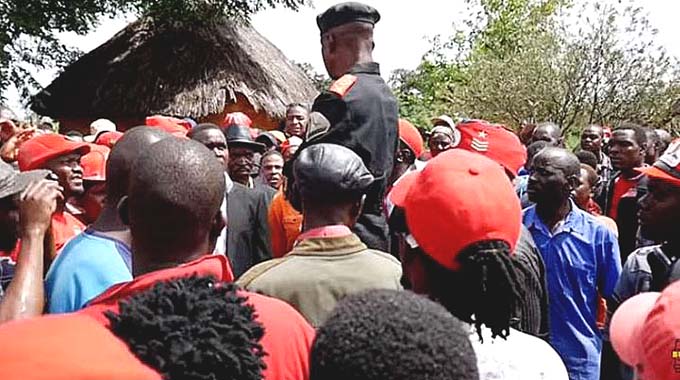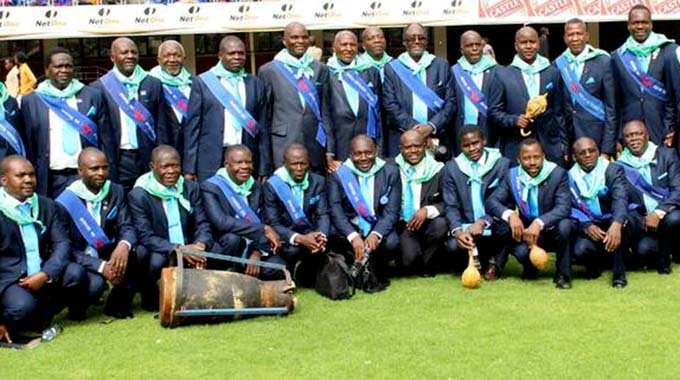Tsvangirai didn’t go peacefully, he went violently

Tichaona Zindoga Political Editor
It was a charged atmosphere at Rufaro Stadium in Harare one fine afternoon in October 2000. Zimbabwe was at a political crossroads with the rise of a new opposition party, the Movement for Democratic Change, amid economic hardship and general discontent in the urban areas.
Rufaro Stadium is found in Mbare, Harare’s oldest township, for long a simmering cultural, social and political pot surrounded by nearby high density areas of equal pedigree.
These townships or high density suburbs — otherwise referred to as ghettos — are a hotbed of various phenomena, politically not least.
(In the nearby Highfield suburb, the Zimbabwe African National Union party, the precursor to Zimbabwe’s ruling party, Zanu-PF, was born at one Enock Nkala’s house and the likes of Mushandirapamwe Hotel, Cyril Jennings Hall, among others, are historical fixtures of the old suburb.)
Yet Mbare is a lot more, in many indices: it is more passionate, more ebullient, more confused and more volatile. On this afternoon of October, Tsvangirai, the leader of the opposition marshalled his supporters into celebrating the first anniversary of the MDC.
As a firebrand former trade unionist, Tsvangirai was given to fiery speeches and threats against Government and authority. Then the moment came.
“The time for mass action is now. We say to Robert Mugabe: if you don’t want to go peacefully, we will remove you violently. This country cannot afford Mugabe for one day longer,” he said.
The nation was stunned. Zimbabwe risked a political conflagration on the back of these words by the MDC leader. The words would haunt him throughout his political and natural life. Tsvangirai died on Valentine’s Day and was buried on February 20, 2018.
Tsvangirai did not go peacefully. He went violently. His funeral was an orgy of violence as members of his family fought each other while his colleagues fought over his position.
The whole thing was seized with a violent spirit. Gogo Lydia Chibwe, Tsvangirai’s mother, gave an expression to the violent and malevolent spirit that overtook the event.
Gogo Tsvangirai became an overnight sensation when she gave an impassioned outburst charging that she did not want Tsvangirai’s wife, Elizabeth, and MDC interim president Nelson Chamisa to be present at the funeral of her son.
She threatened to commit suicide if her wishes were not granted. Throughout the funeral, the Tsvangirai family made a violent sub-plot with the squabbles around the late politician’s estate. His widow was caught in between.
The family sought to disown her and grab her title. It was such an ugly spectacle and soon the matters will be replaying in our courts of law. But the real feast of violence took place around the succession issue. Tsvangirai did not budget for a peaceful succession and transition.
Whoever was going to take reins after him — with the complicated scenario of three vice presidents — was going to do it forcefully; violently. The man who has managed to do that is Nelson Chamisa.
He grabbed power. At the news of Tsvangirai’s death and around the confusion as to who would be acting president, Chamisa convened a national executive council meeting that installed him as the leader of the party for the next one year.
He also seized control of Harvest House, the party’s headquarters on Nelson Mandela Avenue, Harare, shutting out his opponents. Elias Mudzuri, the other vice president, who had sought to take Tsvangirai’s case and had gone to ridiculous lengths of seeking Tsvangirai’s anointment on deathbed, was forced to make a stand from the turf of his house in Milton Park.
It did not help. Thokozani Khupe had long stopped coming to Harvest House, least of all dream of controlling it.
It is a fortress, and the man in charge is Chamisa. When Chamisa secured Harvest House, he went to take charge of the funeral proceedings in Harare and in Buhera where Tsvangirai was laid to rest.
Happily, Gogo Tsvangirai did not carry her threat of committing suicide as Chamisa captained the ship. Officials, including Mudzuri, scrambled to shake Chamisa’s hand as he gave speeches. All hailed King Chamisa.
Except for Khupe, who has taken Chamisa’s power grab rather too badly. And she has every reason to: Khupe and party secretary general Douglas Mwonzora escaped a vicious mob in Buhera at the burial of Tsvangirai.
Violent goons confronted Khupe and threw missiles at her while hurling tribalistic words at her that were meant to convey serious harm and indignity to her person. She was called a dissident and told to “return to Matabeleland”.
We saw a bloodthirsty mob closing in on her and poor Mwonzora. They sought shelter in a hut, but the crowd threatened to burn the house down.
According to her, the goons actually attempted to set the house on fire, but the victims were saved by the wet thatch that could not light up. Now, this is so scary. This level of barbarism has shocked us all.
Even the US Embassy, which has a stake in opposition politics in Zimbabwe, was forced to issue a statement condemning the violence. MDC has always been a violent party, with its own youth militia wing.
It has thugs in our neighbourhoods. It will be easy to blame Nelson Chamisa and point an accusing finger for otherwise benefiting from a system of thuggery that is based at Harvest.
However, Chamisa is simply inheriting a culture that was born under Tsvangirai, who used violence not only to fight Zanu-PF, but also internal rivals. The list of his victims include Gibson Sibanda, Welshman Ncube, Tendai Biti, Toendepi Shonhe, Elton Mangoma, Trudy Stevenson among others.
The ugly scenes and violence that characterised Tsvangirai’s farewell to the world are a legacy of the violence that he entrenched at Harvest House.
The MDC under Tsvangirai became the monster it claimed Zanu-PF was under former President Mugabe. Tsvangirai was at the centre of it all, marshalling thugs to entrench power against party rivals and challenging his external opponents.
Befittingly, he did not go peacefully. He went violently and his ghosts will sure manifest soon.









Comments